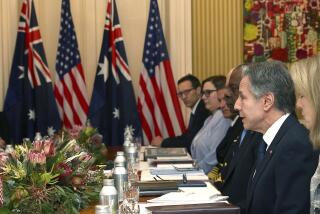Jackson Cites Perils in Nigeria Deadlock : Africa: Pro-democracy activists are prepared to sabotage oil facilities, he warns. Clinton is asked to send a special envoy.
- Share via
ATLANTA — The Rev. Jesse Jackson returned Saturday from a White House-backed mission to Nigeria and called on President Clinton to appoint a special envoy to help resolve an increasingly violent political deadlock in that oil-rich West African nation.
He called it a “combustible situation that may soon lead to civil war.”
Speaking at a press conference arranged for a convention of minority journalists, Jackson said that a Nigerian civil war could be imminent because pro-democracy activists in that country are now prepared to destroy oil production facilities in their bid to pressure military ruler Gen. Sani Abacha to surrender power to detained politician Moshood K. O. Abiola, the apparent winner of last year’s annulled presidential elections.
“The various factions are creating tensions that threaten to tear Nigeria apart at the seams,” Jackson said. “The President needs a special envoy to establish links between the (various) power centers in Nigeria.”
Jackson said he delivered a letter from Clinton to Gen. Abacha on Thursday. In that letter, Clinton asked that the votes from the aborted Nigerian elections of June, 1993, be tabulated and announced, Jackson said. It also said that any military-sponsored conference on the future shape of a Nigerian government would be illegitimate unless the results of the 1993 elections are considered.
If civil war erupts, the carnage could dwarf the Rwandan crisis and interrupt Nigerian oil shipments that are crucial to the U.S. economy, Jackson said.
“One quarter of all Africans are Nigerian,” Jackson said. “A war would result in a reduction of the world’s oil supply, and the United States would lose 5% of its supply. Initially, that would create inflation and eventually lead to the loss of some (U.S.) jobs.”
Jackson said he is not interested in serving as envoy to Nigeria but said he is willing to assist the Clinton Administration in any mediation effort. He said he would deliver a report on his Nigerian findings to the White House on Monday.
Jackson said he met with jailed presidential candidate Abiola during his Nigerian visit. Abiola was charged with treason after he declared himself president to mark the first anniversary of the 1993 presidential election, which was voided by the military while ballots were being counted.
Early returns showed Abiola winning by a large margin. Jackson said that Abiola has a moral claim to the presidency.
“Abiola is in no mood to surrender what he won on June 12,” Jackson said.
Economic activity in Nigerian cities has been brought to a virtual halt as the 31-day-old pro-democracy strikes led by oil unions have grounded transportation and shut factories. Scores of demonstrators have been killed in clashes with the military.
Jackson said the situation is now more volatile because large numbers of students have joined the protest and because unionists are now threatening to destroy oil production facilities--Nigeria’s economic lifeline.
Jackson said he met with unionists and other pro-democracy dissidents during his visit. “The unions have asked the multinational oil companies to stop production,” Jackson said. “If they don’t respond, the protesters said they are prepared to stop production through sabotage.”
The military claims there were improprieties in the Nigerian election and leaders said they are planning to hold a constitutional conference and set new elections at some unspecified date.
“At this point the two sides in the conflict are not talking,” Jackson said.
More to Read
Sign up for Essential California
The most important California stories and recommendations in your inbox every morning.
You may occasionally receive promotional content from the Los Angeles Times.













